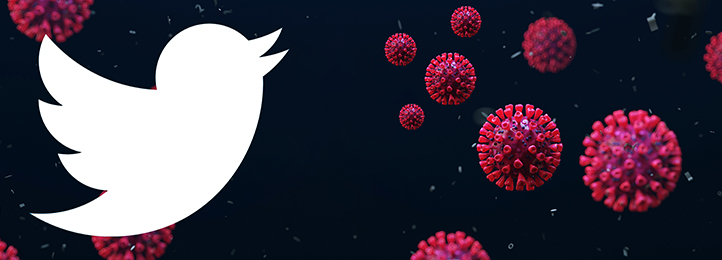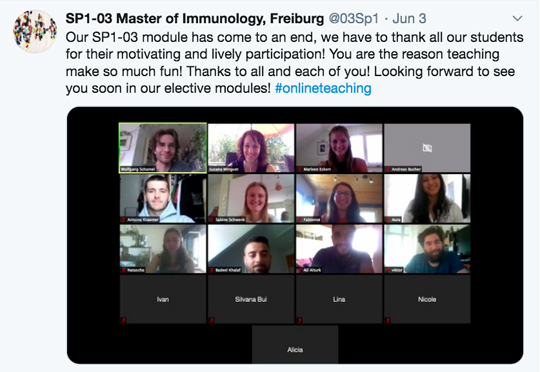Immunobiology in 280 characters or less
Freiburg, Jul 30, 2020
The original plan was an entirely different one altogether. Immunobiologist Dr. Susana Minguet and master‘s students from the Faculty of Biology wanted to visit different laboratories in order to present their everyday work. But like so many other plans, theirs was thwarted by the corona outbreak. Luckily, the lecturer knew what to do immediately. She created an account on the Twitter platform for her students where they can post individual threads on immunobiological aspects related to SARS-CoV-2 and Covid-19. Both lecturer and students agree: it was a very good learning experience indeed.
 Students summarized immunobiological aspects about SARS-CoV-2 and Covid-19 on Twitter. Graphic: rvlsoft, Robert Kneschke/stock.adobe.com; montage: Jürgen Oschwald
Students summarized immunobiological aspects about SARS-CoV-2 and Covid-19 on Twitter. Graphic: rvlsoft, Robert Kneschke/stock.adobe.com; montage: Jürgen Oschwald
For scientists it is not easy to please the public. Not only are they supposed to keep up with the latest research, but they are also obliged to explain what they are doing in their laboratories, preferably with broad appeal so that everyone understands. This is particularly important in the age of the novel coronavirus. Susana Minguet has already experienced for herself how difficult this task can be. The scientist is a lecturer at the Faculty of Biology and works in the Freiburg Excellence Cluster CIBSS - Centre for Integrative Biological Signalling Studies. For the “Day of Immunology” campaign, which aims to raise awareness of the importance of immunology in the fight against infections, autoimmunity and cancer every year, she contributed videos on vaccinations in the context of Covid-19. “That’s when I realized how difficult it is to explain complex topics to the general public,” recalls the scientist. This also led her to the insight that such skill building was completely lacking in her curriculum.
Expertise directly from the home office environment
That’s when she got the idea to use the time that had been planned for the module “Advanced Immunobiology” to visit the laboratories to inform the general public with their scientific knowledge directly from the home office environment. Minguet’s students were also immediately enthusiastic about her proposal. Ihe immunobiologist set about creating a Twitter account, the first hurdle for the lecturer because she first had to get used to the short message service. “We students also had very little experience with Twitter,” explains Sabine Schwenk, who, like the other participants, is studying for a master’s degree in Biology with a focus on Immunobiology. They specifically chose Twitter as a platform for their project. “Perhaps a format like Facebook or Instagram would have been more suitable for reaching people of our generation,” considers Schwenk’s team colleague Marleen Eckert. “But Twitter has a more official and serious character.”
 Change of plan due to the pandemic: Instead of getting to know the work in different laboratories in the seminar, the students made their first experiences in public relations. Photo: Susana Minguet
Change of plan due to the pandemic: Instead of getting to know the work in different laboratories in the seminar, the students made their first experiences in public relations. Photo: Susana Minguet
Research on diverse areas
Minguet and the students set to work for about five weeks starting in April. The 30 students worked mainly in groups of two, with Minguet herself providing some topics. But she was also open to their own ideas. “Some students came up with totally interesting perspectives themselves”" she says happily. The topics covered a wide variety of aspects. The group of Eckert and Schwenk, for example, did research on a potential transfer of Covid-19 through or to pets. “We were interested in why some animals are more susceptible to the virus than others,” explains Eckert. The students searched for publications online, worked through them and presented the state of research at the time. Antoine Kraemer and his group presented a WHO clinical study, the “Solidarity Trial.” In this study, the effect of various agents was to be examined. Kraemer and his project partner conducted research on a total of four drugs, each presenting two drugs individually.
Their first try at public relations
During the work phase, Minguet provided advice and support to her students. “She thought about what would benefit us and maybe other people as well,” Eckert reports. When the work was finished and all students had submitted their contributions, the lecturer published individual threads day after day, consisting of several connected tweets. For the students, the work also brought new experiences. “Our studies are more research-oriented,” explains Eckert. "Therefore, this was our first experience with public relations. The hardest thing was to summarize everything in a nutshell.” Kraemer reports something similar. “One challenge was the character limit. That makes it tricky to formulate everything simply and concisely at the same time. It was a useful exercise for us and it worked out quite well.” At the same time, he emphasizes the importance of transparency in science. “There should be no compartmentalization between science and society in general.” Minguet is also pleased with the project. She is especially pleased to have shown some students a new career opportunity. For example, two students approached her who were thinking about placing their professional focus on informing the wider public. In the end, something really good came out of the changes in plans after all.
Pascal Lienhard
Twitter-Account of Susana Minguet and her students
CIBSS - Centre for Integrative Biological Signalling Studies

